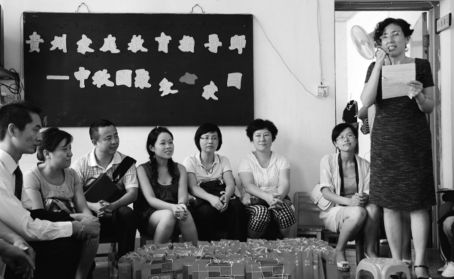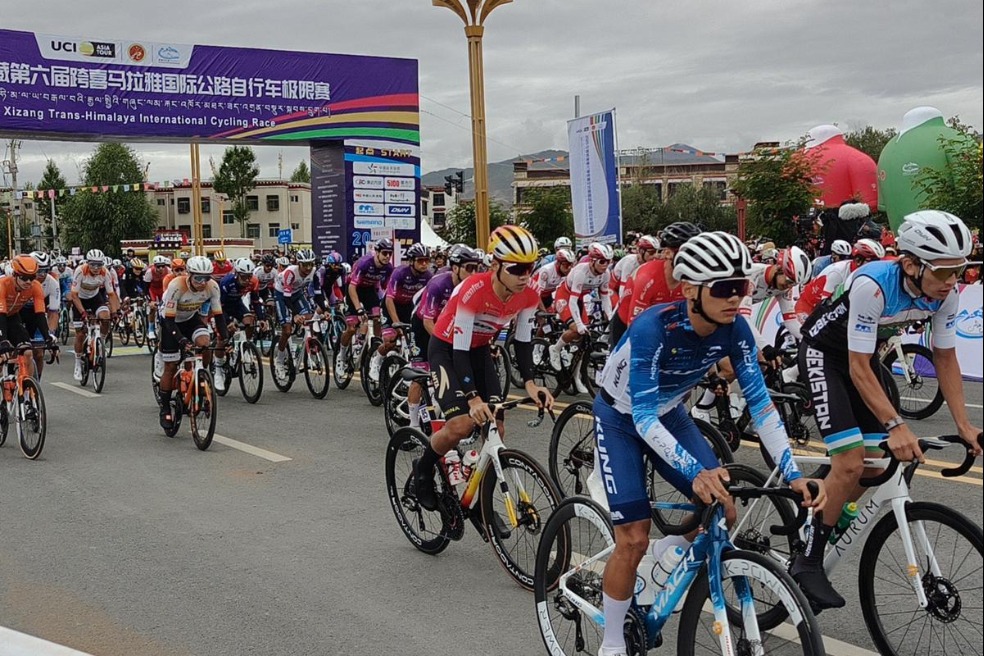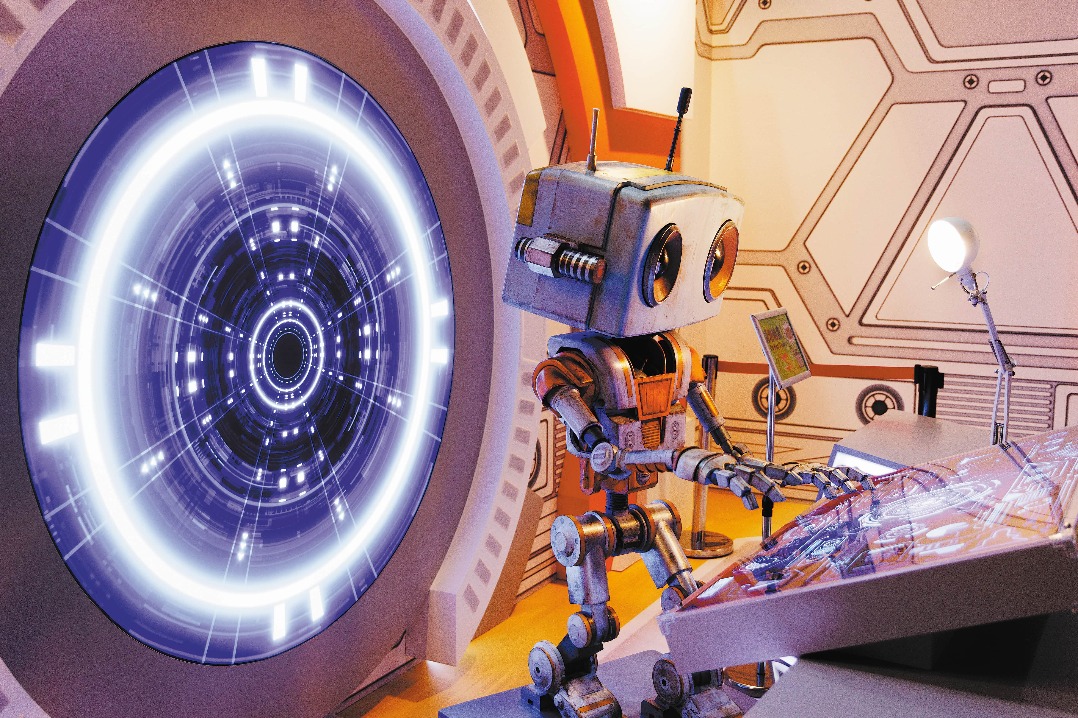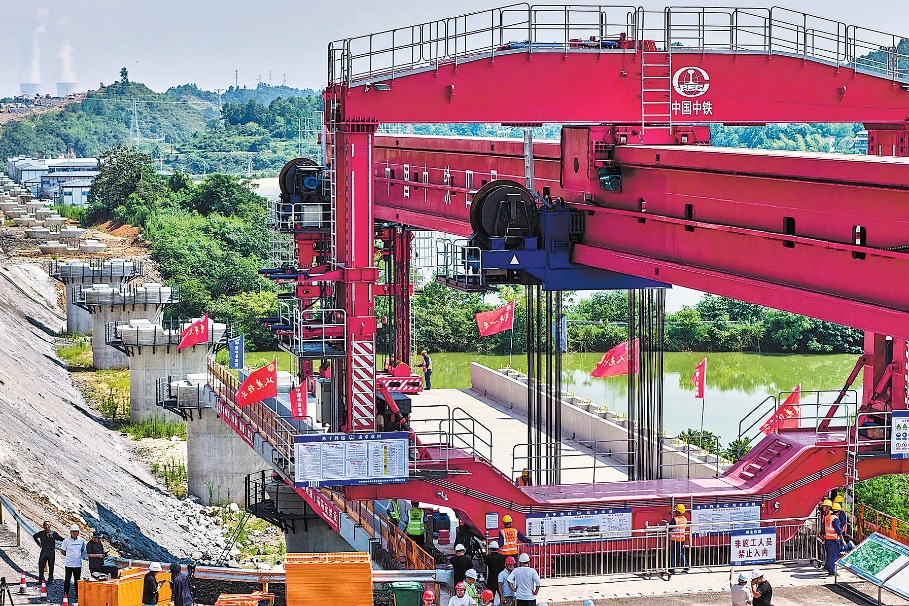Children with autism get chance to flourish

GUIYANG — Zhao Xinling likes to tell her son, whom she affectionately calls Hao Hao, one particular story. At bedtime, a little hare asks a big hare to guess how much he loves him, and the little hare says, "I love you all the way to the moon."
"I tell my son, 'Mom loves you, from here to the stars'," says Zhao. "Although I have been teaching him how to say 'mom' every day, he is still unable to say the word. He is now 24 years old."
Like many parents of children with autism, the 64-year-old has faced challenges and worked hard to help her son since he was diagnosed with severe autism at a very young age.
She is the founder and principal of the Loving Home for Children Special Education and Rehabilitation Center in Guiyang, capital of Southwest China's Guizhou province. It is the first autism rehabilitation institution in the province, and Zhao is also a teacher there.
Over the years, she has provided support to more than 7,000 children with autism. She has witnessed the autistic community flourish — from being under-recognized to being increasingly understood and accepted — and she has seen how the community is gaining more support from broader society.
Autism is a neurodevelopmental disorder characterized by varying degrees of impairment of communication skills and social interaction. Children with autism are sometimes called "children of the stars" in China, as society often perceives them as lonely, and they can exhibit unconventional emotional reactions, language abilities or social skills.
This year's World Autism Awareness Day fell on April 2. A report on autism education showed that in 2019, there were more than 10 million people with an autism spectrum disorder in China, among whom about 2 million were children aged under 12.
Seeking help
Born in 2000, Hao Hao lost his language abilities suddenly when he was 22 months old. Autism was under-recognized in Guizhou at the time, and Zhao had to seek help for her son in other parts of the country.
In 2002, Hao Hao was diagnosed with autism. "Then, I was very confused and didn't know how to provide support for my son, or how to educate him and provide rehabilitation," Zhao says.
To gain a better understanding of autism and learn about rehabilitation for autistic children, she visited rehabilitation institutions, hospitals and schools in cities such as Beijing and Guangzhou, Guangdong province.
"During that time, I met with parents of autistic children from across the country and realized that many families were under enormous pressure," she says.
While seeking medical treatment for her son, Zhao met Guan Fuqin, a doctor at the Guiyang Maternal and Child Health Care Hospital. Now in her 90s, Guan was among the first in Guizhou to provide autism diagnosis services for children.
"Guan advised me to establish an institution in Guizhou where children with autism could learn locally, and where their parents could help one another. She would act as a volunteer, offering support from a medical point of view," Zhao says.
Guan has been providing voluntary diagnosis and treatment services to children at the center for 20 years, as well as lectures and training for teachers and parents, Zhao notes.
In 2003, the Loving Home for Children Special Education and Rehabilitation Center was established, becoming the first rehabilitation and training institution in Guizhou to serve children with autism and other developmental disorders. In 2016, the center began providing services to adults with autism.
"The earlier children with autism receive professional rehabilitation, the better they will integrate into society in the future," Zhao says, adding that children up to 6 years old who receive training at the center are entitled to government subsidies.
Offering motivation
One mother in Guizhou's Yuqing county, who has chosen to be referred to by her surname, Peng, has a 6-year-old daughter with autism. She was diagnosed at the age of 4 and has been receiving rehabilitation at the center for more than two years.
"My daughter has become more talkative and cheerful, and is able to take care of herself to some extent. The government subsidy reduces the financial burden on my family and gives me the motivation to stick to it," Peng says.
Over the decades, China's autism rehabilitation system has continued to improve. In Guizhou, an early screening system for autism has been gradually established, and an increasing number of autism rehabilitation services have been provided by institutions such as disabled persons' federations, hospitals and nongovernmental organizations.
In 2006, Zhao began trying her hand at integrated education. She remembers that during a visit to a regular primary school to plant flowers and other greenery with the students there, she asked the children which plant they thought was the most beautiful.
"The children said that this one is beautiful, and that one is also beautiful," she says. "I wanted to plant a seed in their hearts — life is diverse, and every life deserves to be respected.
"In the past, we wanted autistic children to improve themselves and fit into the lifestyles of neurotypical people. However, through integrated education, neurotypical children can learn to understand, accept and care for autistic children. These two-way efforts can make the lives of autistic children easier, and their families happier," she says.
In 2022, the center moved to a four-story building on a new campus, with the local government providing rent subsidies and many people donating items like office supplies, computers, tables and chairs.
Currently, some 300 people with autism are receiving services at the center every day. It has carried out integrated education practices with over 20 kindergartens, primary schools and high schools in Guiyang over the years, and more than 2,000 autistic children have been enrolled in regular schools.
"Although there are still many challenges ahead that need to be overcome, I am confident about the future," Zhao says. "The parents of autistic children also need to emerge from their loneliness and take care that they don't close themselves off. We need to view autism positively, accept it, and enjoy the different life it offers."
Xinhua

Today's Top News
- Chengdu games hailed as the new benchmark
- Xi, Lula pledge to deepen China-Brazil cooperation
- China, US reach deal to extend tariff suspension
- Demand for?Nvidia’s H20 chip lackluster
- Washington not incarnation of justice: China Daily editorial
- Tariff truce gains time for talks although some tough issues remain to be resolved





























